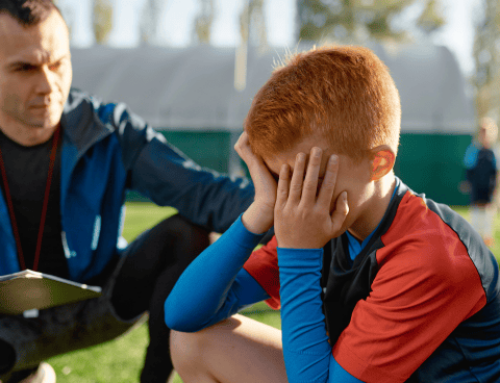Are You Eating Enough? If You’re a Teen Athlete, the Answer’s Probably No
In a world where everyone has an opinion on nutrition, and consumers are constantly blasted with miraculous claims from supplement companies looking to sell something, it’s easy to forget that it doesn’t have to be so complicated.
I am a strength coach for teen athletes of all different sports. Every day, I ask them one question about their dietary habits. It’s not “How many grams of protein are you taking in?” Nor is it, “Are you tracking your food on MyFitnessPal?” It’s simply, “What did you have for breakfast?”
It’s shocking how many teen athletes barely eat anything for breakfast or simply skip the meal altogether. They then try to survive a busy day of academics, sports practices and training with no gas in the tank.
The reality is that teen athletes are calorie-torching machines. Roberta Anding, former Director of Sports Nutrition at the Houston Children’s Hospital and current Sports Dietitian for the Houston Astros, says, “Young athletes struggle with getting enough calories. Since they’ve also got growth and development, their calorie requirements are much higher.” According to the Food and Nutrition Board of the Institute of Medicine, male high school athletes need between 3,000 and 6,000 calories a day, and female high school athletes need between 2,200 and 4,000 calories a day. For an athlete trying to gain weight, those figures are significantly higher.
Here’s the routine many teen athletes follow:
- Wake up just in time for school.
- Eat no breakfast or some sort of quick carb (like a bagel or Pop-Tarts) then shoot out the door.
- Three hours later, eat a school lunch that wouldn’t fill up my 2-year-old.
- Fast forward to practice, where they try to get through a two-hour session of activity on an empty or near-empty stomach.
- If they’re not in season, they may run home to grab a sugar-laden drink and maybe some crackers. They then drag their feet into the gym for a training session, yawning and rubbing their eyes, yet expect to lift heavy weight.
If you want success bad enough, be it in sports or in life, you have to put in the work. Too often do teen athletes not realize that working hard during training and practice is really just a small part of the puzzle. If you’re not complementing those things with proper nutrition, you’re throwing away your hard work.
For most teen athletes, the simplest answer to improving their nutrition is simply eating more. Many teens struggle to pack on muscle mass, complaining that they “eat a ton” yet can’t gain weight. Well, obviously whatever you call “a ton” isn’t enough. Let’s walk through another day-in-the-life of an average teen athlete, but this time, focusing on proper fueling. Keep in mind any of these foods can be replaced with similar options you can find in your fridge or pantry. Not having access to one specific type of food isn’t an excuse not to eat.
Proper nutrition starts in the morning. If you say you don’t have time to eat in the morning, that’s a poor excuse. The quicker you learn that, the more successful you’ll be. If you want time, you have to make time. Get up 10 minutes earlier and avoid the snooze button. Toss two whole eggs in a pan and grab a bagel with peanut butter. If your mom or dad wants to do it, great. But if not, that’s no excuse. They’re not the one trying to win a state championship or get noticed by colleges. If you don’t know how to make eggs, here’s a simple guide. After you finish your breakfast, toss some beef jerky, a piece of fruit and a couple of sandwiches in your bag, and head to school.
RELATED: 9 Athlete-Approved Peanut Butter Sandwiches
Somewhere during your morning, perhaps on the walk between classes, eat a sandwich. I prefer meat (turkey, ham, etc.) on whole wheat bread, but a PB&J works fine, too. Then when you’re buying your school lunch, throw down an extra 75 cents to buy an extra portion of protein, provided you can afford it. You’ll also want to down your other sandwich during lunch.
In the middle of the afternoon, start munching on that beef jerky. After school, eat the piece of fruit. If you’re headed to practice, you’re primed and ready to perform. If you’re just headed home, eat it anyway.
If you have a few hours to kill between school and training, try to eat something that looks like dinner. Meat, veggies and a carb like potatoes or rice. Make sure you’re getting some energy in you before training. You obviously don’t want to eat too much and feel weighed down during your session, but if you’ve got the time to digest it, take advantage.
After your training session, time for another plate of meat, veggies and carbs. Throw some hot sauce on it if you’d like, or if you really want to up the calories, cook the whole meal in a pan alongside a few slices of bacon. That will kick up the protein and make everything taste amazing!
Before bed, you can have a high-protein snack like cottage cheese or Greek yogurt. If you really have trouble getting up in the morning, you can even prepare your breakfast foods the night before, leaving you some extra time for shuteye.
Finally, work backwards from the time you have to get up, and make sure you’re turning off the electronics (yes, that includes your iPhone) 8 hours before the alarm goes off.
That doesn’t sound so hard, does it? Yet for most teen athletes, following a plan like this for one week is enough to experience an amazing boost in energy. They’ll move more weight in the gym, be more energetic in class, feel sharper during homework and practice, and generally just be happier. These aren’t empty promises—doing these things will genuinely change your biology for the better. If you want it bad enough, you’ll do it.
The sad reality is that even though everyone has the capability to follow through on this easy plan, or at least something akin to it, not everyone will. This is why everyone isn’t successful and why everyone doesn’t win state championships. You have to start thinking of proper nutrition as a critical piece of the puzzle. Yes, champions train with consistency. Yes, champions don’t skip reps. Yes, champions know their plays and practice hard. But champions also don’t skip breakfast. Champions also eat nutritious snacks. Champions also come into the weight room properly fueled.
Don’t accept being mediocre because you want to sleep in an extra 20 minutes or because you can’t eat an apple between classes. It’s the small things that will add up over time and create a difference between you and every other athlete out there who has the same dreams and goals as you do.
Photo Credit: YinYang/iStock
READ MORE:
RECOMMENDED FOR YOU
MOST POPULAR
Are You Eating Enough? If You’re a Teen Athlete, the Answer’s Probably No
In a world where everyone has an opinion on nutrition, and consumers are constantly blasted with miraculous claims from supplement companies looking to sell something, it’s easy to forget that it doesn’t have to be so complicated.
I am a strength coach for teen athletes of all different sports. Every day, I ask them one question about their dietary habits. It’s not “How many grams of protein are you taking in?” Nor is it, “Are you tracking your food on MyFitnessPal?” It’s simply, “What did you have for breakfast?”
It’s shocking how many teen athletes barely eat anything for breakfast or simply skip the meal altogether. They then try to survive a busy day of academics, sports practices and training with no gas in the tank.
The reality is that teen athletes are calorie-torching machines. Roberta Anding, former Director of Sports Nutrition at the Houston Children’s Hospital and current Sports Dietitian for the Houston Astros, says, “Young athletes struggle with getting enough calories. Since they’ve also got growth and development, their calorie requirements are much higher.” According to the Food and Nutrition Board of the Institute of Medicine, male high school athletes need between 3,000 and 6,000 calories a day, and female high school athletes need between 2,200 and 4,000 calories a day. For an athlete trying to gain weight, those figures are significantly higher.
Here’s the routine many teen athletes follow:
- Wake up just in time for school.
- Eat no breakfast or some sort of quick carb (like a bagel or Pop-Tarts) then shoot out the door.
- Three hours later, eat a school lunch that wouldn’t fill up my 2-year-old.
- Fast forward to practice, where they try to get through a two-hour session of activity on an empty or near-empty stomach.
- If they’re not in season, they may run home to grab a sugar-laden drink and maybe some crackers. They then drag their feet into the gym for a training session, yawning and rubbing their eyes, yet expect to lift heavy weight.
If you want success bad enough, be it in sports or in life, you have to put in the work. Too often do teen athletes not realize that working hard during training and practice is really just a small part of the puzzle. If you’re not complementing those things with proper nutrition, you’re throwing away your hard work.
For most teen athletes, the simplest answer to improving their nutrition is simply eating more. Many teens struggle to pack on muscle mass, complaining that they “eat a ton” yet can’t gain weight. Well, obviously whatever you call “a ton” isn’t enough. Let’s walk through another day-in-the-life of an average teen athlete, but this time, focusing on proper fueling. Keep in mind any of these foods can be replaced with similar options you can find in your fridge or pantry. Not having access to one specific type of food isn’t an excuse not to eat.
Proper nutrition starts in the morning. If you say you don’t have time to eat in the morning, that’s a poor excuse. The quicker you learn that, the more successful you’ll be. If you want time, you have to make time. Get up 10 minutes earlier and avoid the snooze button. Toss two whole eggs in a pan and grab a bagel with peanut butter. If your mom or dad wants to do it, great. But if not, that’s no excuse. They’re not the one trying to win a state championship or get noticed by colleges. If you don’t know how to make eggs, here’s a simple guide. After you finish your breakfast, toss some beef jerky, a piece of fruit and a couple of sandwiches in your bag, and head to school.
RELATED: 9 Athlete-Approved Peanut Butter Sandwiches
Somewhere during your morning, perhaps on the walk between classes, eat a sandwich. I prefer meat (turkey, ham, etc.) on whole wheat bread, but a PB&J works fine, too. Then when you’re buying your school lunch, throw down an extra 75 cents to buy an extra portion of protein, provided you can afford it. You’ll also want to down your other sandwich during lunch.
In the middle of the afternoon, start munching on that beef jerky. After school, eat the piece of fruit. If you’re headed to practice, you’re primed and ready to perform. If you’re just headed home, eat it anyway.
If you have a few hours to kill between school and training, try to eat something that looks like dinner. Meat, veggies and a carb like potatoes or rice. Make sure you’re getting some energy in you before training. You obviously don’t want to eat too much and feel weighed down during your session, but if you’ve got the time to digest it, take advantage.
After your training session, time for another plate of meat, veggies and carbs. Throw some hot sauce on it if you’d like, or if you really want to up the calories, cook the whole meal in a pan alongside a few slices of bacon. That will kick up the protein and make everything taste amazing!
Before bed, you can have a high-protein snack like cottage cheese or Greek yogurt. If you really have trouble getting up in the morning, you can even prepare your breakfast foods the night before, leaving you some extra time for shuteye.
Finally, work backwards from the time you have to get up, and make sure you’re turning off the electronics (yes, that includes your iPhone) 8 hours before the alarm goes off.
That doesn’t sound so hard, does it? Yet for most teen athletes, following a plan like this for one week is enough to experience an amazing boost in energy. They’ll move more weight in the gym, be more energetic in class, feel sharper during homework and practice, and generally just be happier. These aren’t empty promises—doing these things will genuinely change your biology for the better. If you want it bad enough, you’ll do it.
The sad reality is that even though everyone has the capability to follow through on this easy plan, or at least something akin to it, not everyone will. This is why everyone isn’t successful and why everyone doesn’t win state championships. You have to start thinking of proper nutrition as a critical piece of the puzzle. Yes, champions train with consistency. Yes, champions don’t skip reps. Yes, champions know their plays and practice hard. But champions also don’t skip breakfast. Champions also eat nutritious snacks. Champions also come into the weight room properly fueled.
Don’t accept being mediocre because you want to sleep in an extra 20 minutes or because you can’t eat an apple between classes. It’s the small things that will add up over time and create a difference between you and every other athlete out there who has the same dreams and goals as you do.
Photo Credit: YinYang/iStock
READ MORE:











